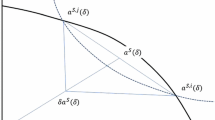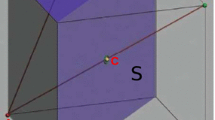Abstract
For bargaining environments given by transferable utility characteristic functions that are zero-normalized and admit a nonempty core, we find a class of random-proposer bargaining games, generalized from Okada (1993), such that there is a one-to-one mapping from these games to the core, each game realizes the corresponding core allocation as its unique (ex ante) Stationary Subgame Perfect Equilibrium (SSPE) payoff profile, and every ex post SSPE payoff profile converges to the core allocation as the discount factor goes to one. The result has a natural interpretation in terms of bargaining power.
Similar content being viewed by others
Author information
Authors and Affiliations
Corresponding author
Additional information
Received: December 2000/Revised: August 2002
Rights and permissions
About this article
Cite this article
Yan, H. Noncooperative selection of the core. Int J Game Theory 31, 527–540 (2003). https://doi.org/10.1007/s001820300137
Issue Date:
DOI: https://doi.org/10.1007/s001820300137




